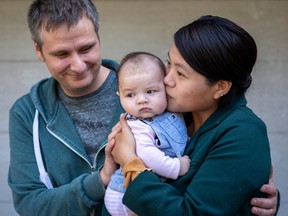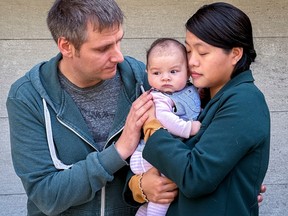“We are not trying to skip a line. We’re just trying to get into a line, trying to get on a waiting list somewhere,” said Mark Raby, whose newborn daughter needs special attention.

.
Three-month-old Leah Raby was born with a medical condition that causes one or both kidneys to swell due to urine not draining properly.
Announcement 2
.
Hydronephrosis in newborns requires monitoring by medical professionals. But like tens of thousands of Ontarians, baby Leah doesn’t have a family doctor overseeing her care.
.
This week, her parents are taking her to CHEO for a scan. Children’s Hospital will follow up on the results as needed. But, without a family doctor to send your medical records to, the results will simply reach your increasingly frustrated parents.
“We’re going to have to keep track of all these things,” says his father, Mark Raby.
“There is no professional who is watching over our daughter. She is amazing”.
The family’s inability to find a doctor is not for lack of trying.
Raby, a 37-year-old teacher, spends almost every lunch hour on the phone, calling doctors’ offices in an attempt to find one that will take care of his family, or at least put them on a waiting list. Earlier this week, he had tried 25 different medical offices and none could even offer him a place on the waiting list.
Announcement 3
.
You have included the names of your family members on Ontario’s Health Care Connect list, which is designed to refer patients without a doctor to a family health care provider who is accepting new patients. Raby said she has been told the wait could be three or four years.
He reached out to Ottawa Public Health and CHEO in a desperate plea for help.
“I realize that we are in unprecedented times and I realize that hundreds of thousands of families have the same or similar stories as ours, but I am only writing to ask what we can do. Surely the answer is not to do nothing,” she wrote to CHEO.
Raby has even sent a letter to the prime minister.
“I just don’t know who to go to or who to test. I’ve been trying for months.
He said he and his wife, Claire, didn’t know their daughter should be vaccinated at two months until a relative who also has a baby mentioned it. They took Leah to a walk-in clinic, where they waited five hours to receive her routine childhood vaccinations. Raby hopes they will do the same for the next round when she turns four months old next month.
Announcement 4
.

The family recently moved to Ottawa. Raby still has a family doctor in Brockville, an hour and a half away, which he is hesitant to give up given the situation. But neither his daughter nor his wife have a family doctor.
“We are not trying to skip a line. We’re just trying to get in line, trying to get on a waiting list somewhere,” she said.
The situation of the Raby family is causing them anxiety, and there are a growing number of families like them throughout the province and the country. The situation is creating a broader concern about the health status of the population and the health system in general.
As of March 2020, 1.8 million Ontario residents did not have a primary care physician or family doctor, said Dr. Kamila Premji, an Ottawa family physician and researcher who is a member of the provincial Primary Care Advisory Committee.
ad 5
.
There were signs before the pandemic that the shortage of primary caregivers was going to get worse. Many family physicians were approaching retirement age and fewer resident physicians were choosing family practice. The pandemic hastened many retirements, creating delays in care, worsening conditions for patients and exacerbating an already dire shortage.
Recent research from INSPIRE (Innovations Strengthening Primary Health Care Through Research) found that one in five Ontarians could be without a primary health care provider within three years.
The critical shortage comes just as primary care is needed more than ever to help rebuild the health system after the pandemic.
In a final report, released this week, the now-dissolved Ontario COVID-19 Scientific Advisory Board said the province needs more primary care doctors to meet the growing need and they should be better integrated into the health system.
ad 6
.
“Primary care is a crucial component of pandemic and health emergency preparedness, response and recovery. It is also essential for continued health system improvement, person-centered care in communities, and optimal population health for Ontarians,” the scientific desk wrote, adding: “Urgent efforts are needed to address factors that limit the provision of primary care”.
These include ensuring the training, support and retention of interdisciplinary health teams to deliver patient care.
Premji of Ottawa, who was one of the authors of the scientific roundtable abstracts on primary care, said that of the medical residents who choose family medicine, fewer practice integrative family medicine, which she describes as primary care “of the cradle to grave” that is associated with better outcomes for patients and lower costs for the health system.
ad 7
.
Among the issues that make it less appealing is that as many as half of primary caregivers say they now spend between 10 and 19 hours a week on administrative tasks.
Meanwhile, there are few interdisciplinary teams available for clinicians to join. Premji said additional funding is needed to support more interdisciplinary teams as part of improving retention and bringing more doctors into primary care.
“I think there is a misperception that the team-based model of care is either too expensive or not effective,” Premji said, adding that the data challenges that notion and that both patients and health professionals like the model.
Meanwhile, what is expected to be a severe viral season has arrived in Ontario, COVID-19 cases are on the rise, with new variants on the horizon, and many patients have worsening conditions after delaying treatment during the pandemic.
Premji said he is concerned that current acute care pressure is postponing desperately needed action to improve and expand primary care, leaving more people without a primary caregiver.
“I really feel a lot of empathy for those families.”
Meanwhile, Mark Raby, who continues to search for a doctor to care for his young daughter and family, finds it hard to believe this is the reality in Ontario.
“We are at our wits end.”
-
CHEO advises families to bring blankets and toys as emergency wait times grow
-
A local family’s struggle to care for a loved one with ALS at home



